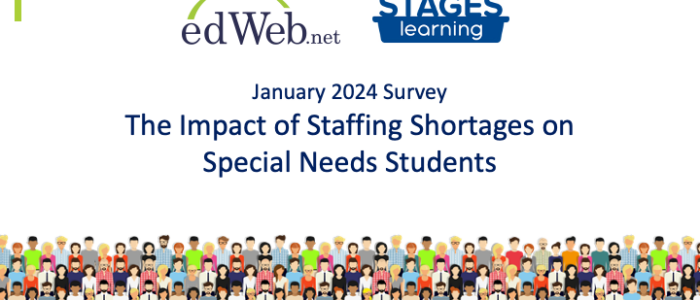edWeb Survey on the Impact of Staffing Shortages on Special Needs Students
edWeb.net, in partnership with Stages Learning, has published the results of the second annual survey on The Impact of Staffing Shortages on Special Needs Students. The survey is designed to get quantitative and qualitative feedback from edWeb members on the impact of teacher and paraprofessional staff shortages, the professional learning support that is being provided, and strategies that may help to alleviate the staffing shortages.
The 2024 survey was emailed to 62,476 edWeb members in the United States with a role or interest in special education and received 742 responses. This is comparable to last year.
The quantitative results show that teachers and paraprofessionals who work with special needs students continue to be severely understaffed.
Lisa Schmucki, founder and CEO of edWeb, presented a summary of the survey results on an edWebinar with Stages Learning. A recording of the program can be viewed here. A copy of the survey results can be viewed here.
The survey received over 500 comments filled with in-depth insights and ideas. edWeb used ChatGPT to summarize the many major issues:
Given the length and depth of the responses, it’s clear that there are significant challenges faced in special education, particularly related to staffing and resource availability. Here is a summarized version of the major points:
- Staffing Shortages: There’s a critical need for more special education teachers and paraprofessionals. The shortage leads to larger class sizes, less individual attention, and inadequate support for students with special needs.
- Professional Development: Both teachers and paraprofessionals require more targeted training to meet the diverse needs of special education students effectively.
- Compensation and Working Conditions: Many comments suggest that improved pay and benefits, as well as a balanced workload, could help attract and retain qualified special education staff.
- Diverse Student Needs: There’s a wide range of special needs among students, including behavioral, emotional, and academic challenges, that require more resources and individualized approaches.
- Administrative Support: There’s a call for better support and understanding from administrators, particularly regarding the complexities of special education.
- Resource Allocation: Educators express the need for better allocation of resources, such as assistive technologies and materials tailored to special education.
- Inclusion and Integration: Challenges with effectively integrating special education students into general education settings were mentioned, as well as the need for adaptation in teaching methods.
- IEP Implementation: Meeting the individualized education program (IEP) goals for each student is made difficult due to staffing shortages and time constraints.
- Educational Pathways: Concerns were raised about alternate certification pathways and the need for a more robust training system for special education professionals.
- Parental and Community Support: Enhanced engagement and understanding from parents and the community could improve the special education environment.
- Emotional and Mental Health: The emotional and mental health of students and educators alike are strained due to the high demands and challenging work environment.
- Recognition and Respect: A sentiment for greater recognition and respect for the demanding work that special education entails was evident.
- Legal and Bureaucratic Pressures: Educators feel burdened by the legal and administrative aspects of special education, which can detract from teaching time.
- Work-Life Balance: The difficulty in achieving a work-life balance due to the demands of the profession is leading to burnout and turnover.
- Student Progress and Outcomes: The lack of resources and support is impacting student progress, with many not receiving the services they require to succeed.
In essence, the comments highlight a special education system under strain, with passionate educators calling for systemic changes to better support students and staff. The need for more resources, better training, fair compensation, and a supportive work environment are consistent themes.
ChatGPT did a great job summarizing the major issues, but reading all of the 500 comments provides more depth on the issues and many ideas. edWeb can provide all of the survey comments to policy and research organizations who would like to study this in greater depth.
A copy of the survey results can be viewed here.
A video presentation of the results can be viewed here.




Comments are closed.